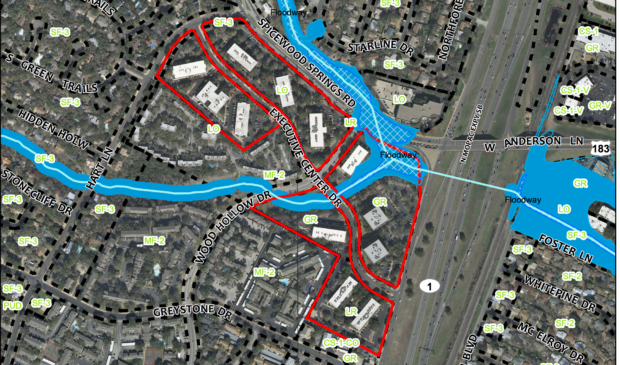Council moves toward Austin Oaks PUD approval
Monday, December 19, 2016 by
Jack Craver Shortly after approving the contentious Grove at Shoal Creek planned unit development on Thursday, City Council took an important step toward approving another West Austin development that has divided neighbors over concerns about traffic, environmental protection and neighborhood preservation.
In the early morning hours Friday, Council voted to approve, on first reading, the Austin Oaks PUD sought by Spire Realty. The PUD, which is proposed for 31.4 acres of land at the southwest corner of MoPac Expressway and Spicewood Springs Road, must now be approved on second and third reading to go into effect.
Council approved the PUD recommendation made in November by the Zoning and Platting Commission, which closely aligns with the original recommendation made by city staff. The development will consist mostly of office buildings but will also include 250 apartments, 10 percent of which will be reserved for families with incomes at 60 percent of the area median.
Council opted not to consider a number of additional restrictions that were negotiated between Spire and neighbors at the beginning of the year, when Spire agreed to engage with residents in a “design charrette” in which neighbors, the developer and outside experts sought over the course of several public meetings to develop a project that would satisfy all parties. Plenty of neighbors were unhappy about the plan that came out of the charrette, but some neighborhood leaders saw the result as a major improvement.
Council members expressed concerns that some of the conditions that residents and the developer proposed adding to the PUD ordinance had not been fully vetted by the city legal department and that it was too late at night for Council members themselves to dive into the details.
“I’m not comfortable now that we’re talking at this level of detail at 1 o’clock in the morning,” said Council Member Ann Kitchen.
Mayor Pro Tem Kathie Tovo also noted that she would probably not be able to support a measure, which was pushed by the neighborhood, to limit the development’s number of apartments with two bedrooms or more. She sympathized with residents’ concerns about overcrowded schools, she said, but limiting “family-friendly” housing in high-opportunity areas ran directly counter to a major city goal.
The vote was 6-3 in favor of stripping out those provisions from the recommendation, with Council members Sheri Gallo, Greg Casar and Don Zimmerman in dissent and Council members Delia Garza and Ellen Troxclair absent.
Gallo, in whose district the proposed project is located, spoke against removing the neighborhood-backed provisions from the recommendation, saying that she wanted to support “the work that has been done so far” between the group and the developer.
The PUD language recommended by the Zoning and Platting Commission also had critics on the dais. Tovo said she is opposed to a provision in the proposed ordinance that allows Austin Independent School District employees making up to 120 percent of the median family income to live in half of the housing that would otherwise be restricted to those at 60 percent MFI.
As much as she supports finding housing solutions for teachers, said Tovo, she was not comfortable backing a measure that might come at the expense of those in even lower income brackets.
Tovo’s amendment to remove the provision was defeated, with only Council Member Greg Casar joining her in support. There are signs, however, that the provision will not be included in the final ordinance due to Deputy City Attorney Deborah Thomas’ warning that designating housing for a certain type of employee would likely face a legal challenge.
Dozens of neighbors showed up at City Hall to speak on the project, many complaining that the charrette failed to address their concerns about traffic, building height, the loss of heritage trees and the burden that an influx of new families could have on area schools that are already over capacity.
Vallarie Sinclair, of the Balcones Civic Association, said that the charrette had barely reduced the anticipated number of vehicle trips generated by the project – from 19,819 per day to 19,648.
“We are right back where we started,” she said.
Ben Luckens, a member of the Northwest Austin Civic Association who served as the project manager of the charrette, disagreed. The proposed project was precisely the type of transit-oriented development that the city needs in order to solve its traffic crisis, he argued.
“The simple fact is that the way to reduce traffic congestion is by getting the heck out of our cars and by shortening the length of trips that we take by car,” he said.
Attorney Michael Whellan, representing Spire and applicant Twelve Lakes LLC, pointed out that current zoning on the property allows up to 950,000 square feet of commercial property and up to 30,000 vehicle trips. Unlike what the company is offering through the PUD, Whellan said a product created under current rules would include no housing, parkland, water detention or traffic improvements.
Council ultimately voted 7-1-1 to approve the PUD on first reading, with Tovo opposed, Council Member Leslie Pool abstaining and Council members Delia Garza and Ellen Troxclair absent. Council will take up the PUD again on Feb. 2, when it will begin to consider amending the ordinance to reflect what has thus far been worked out between the developer and neighbors.
The Austin Monitor’s work is made possible by donations from the community. Though our reporting covers donors from time to time, we are careful to keep business and editorial efforts separate while maintaining transparency. A complete list of donors is available here, and our code of ethics is explained here.
You're a community leader
And we’re honored you look to us for serious, in-depth news. You know a strong community needs local and dedicated watchdog reporting. We’re here for you and that won’t change. Now will you take the powerful next step and support our nonprofit news organization?






